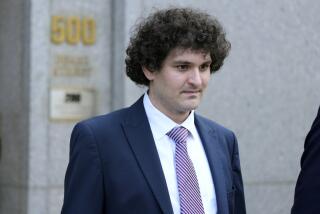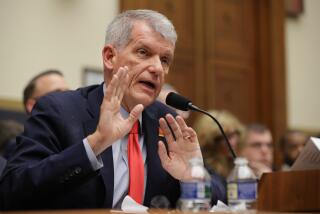Lay Faults Fastow for Enron’s Collapse
- Share via
HOUSTON — Enron Corp. founder and former Chairman Kenneth L. Lay began his long-awaited testimony Monday by declaring his innocence and telling a federal jury that the energy company’s 2001 bankruptcy filing turned his American dream into an “American nightmare.”
Lay quickly drew a distinction between responsibility and blame for Enron’s collapse. Although he said he accepted “full responsibility for everything that happened at Enron,” Lay leveled much of the blame at Enron’s former chief financial officer, Andrew S. Fastow, who looted the company of millions of dollars, pleaded guilty to conspiracy and became the government’s star witness.
“The deceit of Andy Fastow” headed Lay’s list of factors in the collapse of Enron, followed by a series of negative news articles in the Wall Street Journal that Lay said was prompted by short-sellers, investors who stood to get rich betting that Enron’s stock would fall.
A slowing economy, the 9/11 terror attacks and uncertainty surrounding former Chief Executive Jeffrey K. Skilling’s surprise resignation from Enron in August 2001 also contributed some of the “tinder” for a panic that, like a run on a bank, couldn’t be stopped once it had started, Lay said.
At the time, Enron’s gas and electricity trading business had grown into a behemoth that generated 90% of the company’s profit. But that business, Lay testified, was “totally dependent” on the confidence of its trading partners. When they lost confidence, they stampeded to cash in their positions and pull money back from Enron, a process that ended only with the bankruptcy filing.
The conspiracy and fraud trial, which entered its 13th week Monday, is the first time that Lay has told his story under oath. His codefendant, Skilling, testified before Congress, a grand jury and the Securities and Exchange Commission in the months after Enron’s bankruptcy filing.
Skilling, tense and acerbic, completed two weeks on the stand Thursday. Lay, under questioning by defense lawyer George McCall “Mac” Secrest, was calm and serious, with only a glimpse or two of the smiling, avuncular frontman whom Houston had come to know during his later years heading Enron.
Lay’s first and second wives and several of his five children and their spouses sat in the front row of the crowded courtroom. His daughter Elizabeth, a trial lawyer and member of his legal team, sat next to him at the defense table. Skilling’s present and former wives also had attended his testimony.
Lay, 64, faces six counts of conspiracy and securities fraud. Skilling, 52, faces 28 counts of conspiracy, securities fraud and insider trading. The two are accused of lying to the public to hide Enron’s shaky financial health and conspiring with subordinates to hide losses and pump up reported profit.
Lay said the conspiracy charge was “about the most ludicrous thing in the indictment.” He said it was inconceivable that he would have resumed the CEO’s job upon Skilling’s departure and immediately taken charge of a conspiracy.
Asked to name his biggest mistakes at Enron, Lay said he never should have agreed to Fastow’s hiring, never should have let him rise to CFO and never should have allowed him to create and run his now-notorious off-the-books partnerships while continuing to serve as CFO. The government contends that the Fastow partnerships were a mechanism for hiding Enron’s “dog” assets and creating fraudulent profit.
Lay backed up Skilling’s testimony that the younger executive had resigned for personal reasons, not because of any impending blowup at Enron.
Lay said he was reluctant to take back the CEO’s job, just as he had been reluctant to stay at the company after Skilling had been named CEO the previous February. Lay said it was his business philosophy that when a chief executive steps down, especially after a long tenure, he ought to leave the company entirely, so the new CEO didn’t feel as if he was looking over his shoulder and so that the board of directors was clear about who was in charge.
Lay said that Skilling and the board talked him into staying, instead of retiring as he’d wanted to. “I suspect that if I’d done that,” he said, “I wouldn’t be sitting here right now.”
More to Read
Inside the business of entertainment
The Wide Shot brings you news, analysis and insights on everything from streaming wars to production — and what it all means for the future.
You may occasionally receive promotional content from the Los Angeles Times.










